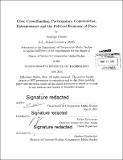| dc.contributor.advisor | Ethan Zuckerman. | en_US |
| dc.contributor.author | Davies, Rodrigo | en_US |
| dc.contributor.other | Massachusetts Institute of Technology. Department of Comparative Media Studies. | en_US |
| dc.date.accessioned | 2014-09-19T21:30:51Z | |
| dc.date.available | 2014-09-19T21:30:51Z | |
| dc.date.copyright | 2014 | en_US |
| dc.date.issued | 2014 | en_US |
| dc.identifier.uri | http://hdl.handle.net/1721.1/89954 | |
| dc.description | Thesis: S.M., Massachusetts Institute of Technology, Department of Comparative Media Studies, 2014. | en_US |
| dc.description | Cataloged from PDF version of thesis. | en_US |
| dc.description | Includes bibliographical references (pages 151-173). | en_US |
| dc.description.abstract | Crowdfunding, the raising of capital from a large and diverse pool of donors via online platforms, has grown exponentially in the past five years, spurred by the rise of Kickstarter and IndieGoGo. While legislative attention in the US has turned to the potential to use crowdfunding as a means of raising capital for companies, less attention has been paid to the use of crowdfunding for civic projects - projects involving either directly or indirectly, the use of government funds, assets or sponsorship, which may include the development of public assets. This project analyzes the subgenre of civic crowdfunding from three perspectives. First, it provides a comprehensive quantitative overview of the subgenre of civic crowdfunding, its most common project types and its geographic distribution. Second, it describes three edge cases, projects that, while uncommon, demonstrate the current limits, aspirations and potential future path of the subgenre. Third, it analyzes the historical and intellectual paradigms within which civic crowdfunding projects and platforms are operating: whether they are best located within the historical context of community fundraising, participatory planning, entrepreneurial culture or a combination of the three. In addressing these questions, the thesis will explore the potential benefits and challenges of using crowdfunding as a means of executing community-oriented projects in the built environment, and offer proposals for how public and non-profit institutions can engage with crowdfunding to realize civic outcomes. | en_US |
| dc.description.statementofresponsibility | by Rodrigo Davies. | en_US |
| dc.format.extent | 173 pages | en_US |
| dc.language.iso | eng | en_US |
| dc.publisher | Massachusetts Institute of Technology | en_US |
| dc.rights | M.I.T. theses are protected by copyright. They may be viewed from this source for any purpose, but reproduction or distribution in any format is prohibited without written permission. See provided URL for inquiries about permission. | en_US |
| dc.rights.uri | http://dspace.mit.edu/handle/1721.1/7582 | en_US |
| dc.subject | Comparative Media Studies. | en_US |
| dc.title | Civic crowdfunding : participatory communities, entrepreneurs and the political economy of place | en_US |
| dc.type | Thesis | en_US |
| dc.description.degree | S.M. | en_US |
| dc.contributor.department | Massachusetts Institute of Technology. Program in Comparative Media Studies/Writing | en_US |
| dc.identifier.oclc | 890127961 | en_US |
